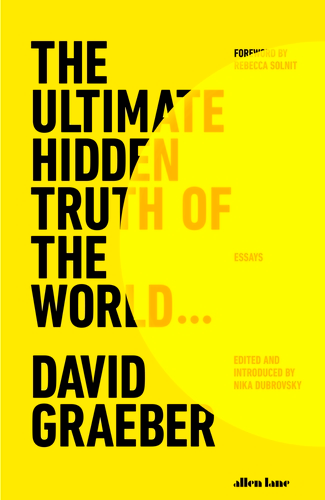Change Everything No 33: Relishing David Graeber, so sharp, so playful, so right
From 'bullshit jobs' to direct democracy, demolishing Samuel Huntington to deconstructing debt
Social media news
Call me perhaps an “early middle” adopter: I’ve joined up to BlueSky - as it seems in the past week have an awful lot of others. The interface is mercifully simple and like The Other Place (even if there are differences in the way it works in practice) - and the company very congenial.
Relishing the work of David Graeber
You might have noticed in the past week or two the name of the late, great David Grabeber popping up in lots of media outlets. It is a name that anyone who’s been to one of my book talks will recognise - his brilliant work The Dawn of Everything, written with David Wensum - is `one of my standard “further reading” recommendations: a big book but unputdownable, and powerful testimony ranging over 300,000 years of human beings on this planet to the fact that history is not pre-written, but made by the actions of people.
Our existence has been wonderfully, gloriously, rich and varied. Which makes our heavily globalised, chainstorised, homogenised existence today look terribly dull. I was stomping recently around a French train station grumbling about the fact that where there was once a nice little local cafe with proper plates and cutlery, there is now only a dull - just the same as in London - chain store, with the usually accompanying flood of plastic containers.
Graeber sadly died in 2020, so the new book just out that has prompted the flood of commentary, including from Rebecca Solnit in the Guardian, is a collection of his writings - something of a “best of”, titled The Ultimate Hidden Truth of the World…. The intellectual trajectory that it temporally covers my own intellectual journey: the first essay, “There Never Was a West”, (issues brilliant addressed also by Naoíse Mac Sweeney's The West: A New History of an Old Idea, which I discussed in an earlier Substack) takes to pieces the ridiculous Samuel Huntingdon idea of the “Clash of Civilisations”. Which reminded me I won an undergraduate essay topic competition at the University of New England (Australia) taking a similar approach about Samuel Huntington’s then new exercise in hubris and stereotyping, which must have been 1994, the year after the Foreign Affairs essay with that title came out. (Call me modestly proud.) Here’s Graeber’s take:
“In most ways, Huntington’s argument is just typical, old-fashioned Orientalism: European civilization is represented as inherently dynamic, ‘the East’ … as stagnant, timeless and monolithic. What I really want to draw attention to, however is just how incoherent Hungtinton’s notions of ‘civilisation’ and ‘culture’ really are. The word civilisation, after all, can be used in two very different ways. It can be used to to refer to a society in which people live in cities, in the way an archaeologist might refer to the Indus Valley. Or it can mean refinement, accomplishment, cultural achievement. Culture has much the same double meaning. One can use the term in its anthropological sense, as referring to structures of feeling, symbolic codes that members of a given culture absorb in the course of growing up and their daily life… [Bourdieu’s habitus]. Alternatively, one can use the word to refer to what is also called ‘high culture’, the best and most profound productions of some artistic, literary or philosophical elite. Huntington’s insistance on defining the West only by … concepts - such as freedom and human rights - suggests that, in either case, it’s mainly the latter sense he has in mind… civilizations have to be conceived basically as traditions of people reading one another’s books. It is possible to say Napoleon or Dsraeli are more heirs to Plato and Thucydides than a Greek shepherd of their day for one reason only: both men were more likely to have read Plato and Thucydides…. It it were not, it would be hard to imagine how one could end up with a civization that begins in ancient Greece, passes to ancient Rome, maintains a kind of half-life in the Medieval Catholic world, revives in the Italian renaissance and then passes mainly to dwell in those countries bordering the North Atlantic. … One might call it the Great Books theory of civilization… The problem is that, if Huntington applied this model consistently, it would destroy his argument. If civilizations are not deeply embodied, why, then, should an upper-class Peruvian woman or a Bangladeshi farm boy not be able to take the same curriculum and become just as Western as anyone else? But this is precisely what Huntington is trying to deny.” (pp. 11-13)
Okay, I ran that quote at some length, just because I enjoyed it, but of course that’s a really weak argument to be taking on. Graeber really is much more about constructing models and ideals, and demonstrating their long histories - about the foundational place of democracy in very many socities, and its “stubborn popular appeal”. “For most people, democracy is still identified with some notion of ordinary people collectively managing their own affairs. It already had this connotation in the 19th century, and it was for this reason that 19th-century politicans, who had earlier shunned the term, reluctantly began to adopt the term and refer to themselves as ‘democrats’.” pp. 5 (That of course was after the drawing up of the American constitution, that same constitution that now threatens to allow the US’s richest man gut its institutional structures to his own commercial benefit.)
As Solnit reminds us in the foreword, it was Graeber’s Fragments of an Anarchist Anthropology that told us about the Madagascar’s Sakalava people who “officially revere dead kings - but those kings make their wishes known though spirit mediums who are usually elderly women of commoner descent”. (p. xi) And Graeber himself reminds us of the Indian thinkers and writers who in the later 19th-century started to find examples of deliberative “democracy” in their own history, from the governance of Buddhist monasteries to Hindu craft guilds. “Questions of authenticity are at best of secondary importance. Such traditions are always largely fabrications. … The point is that, in every case, what we have are political elites - or would-be political elites - identifying with a tradition of democracy in order to validate essentially republican forms of government. … we are looking at different aspects of the same planetary process: a crystallization of long-standing democratic practives in the formation of a global system, in which ideas were flying back and forth in all directions, and the gradual, usually grudging adoption of some by ruling elites.” (pp. 41-2)
That brings us to one of Graeber’s most central, and exciting, tenets, that fluid, diverse, fast-moving societies are places where a great many positive innovations can take place. (Hence his other recent publication on Pirate Enlightenment.) These are “spaces of democratic improvisation, in which a jumbled amalgam of people, most with at least some initial experience of communal self-government, find themselves in new communities outside the immediate supervision of the state”. (p. 45) Which might allow us to take today as a point of encouraging possibility.
I’ve focused on the first essay because it picks up some of my favourite issues, but there are essays on many other Graeber classics in this book - “bullshit jobs” of course (I had fun getting that in Hansard), and some fascinating exploration (from firsthand experience) of the interactions between police and protesters, including why police so often make deals at demonstrations and then break them: “They have to, as a matter of principle, since to do otherwise would be to admit the existence of a situation of dual power: it would be to deny the absolute incommensurability of the state.” (p. 234)
One of the great things about Graeber, unlike to many recent writers, is that he uses generally everyday language, and boils down issues to their nuts and bolts: “In our society, there seems a general rule that, the more obviously one’s work benefits other people, the less one is likely to get paid for it… nurses, garbage collectors, or mechanics, it’s obvious that were they to vanish in a puff of smoke, the results would be immediate and catastrophic. A world without teachers or dockworkers would soon be in trouble, and even one without science fiction writers or ska musicians would clearly be a lesser place. It’s not entirely clear how humanity would suffer were all private equity CEOs, lobbyists, PR researchers, actuaries, telemarketers, bailiffs or legal consultants to similar vanish.” (p. 82) The reality of the financialisation of our society - of which he was an early understander - is brought out clearly in another essay, summing up the world of 2007 “everybody was scamming everybody. But was was really going on, what financialization actually means is they collude with the government … to change the law so as to put eberyone deeper and deeper in debt, directly turning their income over to the FIRE [financial, insurance and real estate] sector.” (p. 66)
And he finds such interesting examples and stories: I did not know that Germany has memorials “To the Unknown Deserter”, the first being in Potsdam and inscribed “To a man who refused to kill his fellow man.” (p. 178) And draws out absurdities so clearly. Contrasting to an ideal society of an “endless and overlapping collection of directly democratic voluntary associations and communities”, he notes how once people begin to do this, “the moment they organize in any way - say by forming labor unions or political associations - they are no longer the public but ‘special interest groups’ presumed by definition to be opposed to the public interest.” (p. 229)
So if you haven’t encountered Graeber, this book is a great survey with which to start. And if you have, it will feel like a comfortable run through the classics, with those moments of “whow, that is so well put” that make him so rewarding: you can’t have remembered all, or even most, of them from previous reading.
Picks of the week
Reading
We could all do with a bit of escapism, so I’ve been enjoying reading about earwigs. For prurience, earwig sex really takes some beating, but you don’t have to venture there to find out fascinating things: not just that the mothers care for their eggs (which I already knew), but that if they are forced away from the eggs, they will return and continue the care. And the process is complicated:
“She uses a small brush on her mouthparts to remove the spores of fungi that can kill the eggs. Secondly … she applies water-repellent hydrocarbons to keep them from drying out. [But]… Males, it turns out, love to snack on eggs, even ones that they fathered. To chase them off, females raise their abdomens to show off their pincers. If that’s not enough, they can use the pincers to hurt the male — even to cut him in half.”
As for earwig social life, well, it has its curiosities: “Earwigs can also spray each other with defensive secretions that may have antimicrobial properties too. “They often use those secretions when meeting others,” says Meunier. “Maybe it also prevents the spread of disease.”
I also learnt that the eggs need winter cold to be able to germinate (why scientists found it so hard to breed them in the lab), which does raise the question about what impact the climate emergency is going to have on them: like many species it seems likely they’ll be forced into high latitudes.
Listening
Where did 20th-century science go so wrong, get so embedded in similes of the genome as being like a machine blueprint, of being able to “find a gene” for aggression or “a cure for cancer” How did the immensely complex interaction of life get simplified down to physics-style equations? How could there still be common belief of simple eye-colour inheritances, when Mendelian genetics is entirely wrong to claim blue-eyed parents cannot have brown-eyed children? In fact, of course, there is not one single gene or factor that produces eye colour, but the inputs are multifactorial, and the outcomes infinitely variable.
I’m not sold - by listening to the London Review of Books Podcast with reviewer Lorraine Daston discussing Gregory Radick’s Disputed Inheritance - that the early death of Oxford University-based scholar Walter Frank Raphael Weldon, a champion of complexity, which left the field of debate to Cambridge’s William Bateson, a Menedelian fundamentalist, was a, or the, key factor, but I’m very glad the sociology and history of biology, and its disastrous 20th-century turns, are being discussed. The podcast is a start; I’ll be going on to the book
Thinking
Further complicating our understanding of evolution is the developing approach of holobiont biology. We - and all other complex organisms - are not of course a single species, but in our case a complex of some 50,000 species: you’ve probably heard of the gut microbiome, but then there’s also the skin microbiome, the lung microbiome, the vaginal microbiome …. etc etc.
“Sometimes microbes explain more biological trait variation in organisms than genes do. This is the case, for instance, with the likelihood of human colon cancer, cholesterol levels, and body mass index. And, more importantly, if you take host genetics and microbes together, you start to see a fuller picture of how life varies and changes over time.”
Researching
Photo by National Institute of Allergy and Infectious Diseases on Unsplash
Mycobacterium tuberculosis is the world’s top infectious disease killer, a bacteria that you would expect had been studied to the nth degree, and understood down to the finest details. You would - astonishly - be absolutely wrong: a further demonstration in which 20th- (and early 20th-century) science has been directed down simplified, simplistic and misleading paths. (In a study that should have a big impact on the debate about the value of studying model organisms.) A groundbreaking study of the species overturns “core beliefs of bacterial cell biology and hint at why the deadly pathogen so readily outmaneuvers our immune system and antibiotics”. Some basic assumptions are absolutely wrong: growth is not exponential over a single specimen’s lifespan, as had been assumed from the models (starting slow then speeding up), but can be equal right through to the point of division, which suggests its method of controlling growth is different. And it can grow from either end (whereas in other species it can only extend from the end opposite where it budded off the “mother”). Understanding these facts and more are surely crucial to understanding the disease.
Almost the end
A bit of serious fun: ability to navigate (without a cellphone!) appears to be neither related to genetics nor gender, but rather to how much experience you have in the activity. Who’d have thought it?! Practice something and you get better at it. And speaking as someone who for decades has loved - when I get the chance - to spend the first day in a new city or country wandering around, following my nose, getting the lay of a land, it makes an awful lot of sense to me.
What did you think?
You can also find me on Instagram, Facebook, LinkedIn, TikTok and X.





Astonishing the ease with which David Graeber deconstructs our very sociopolitical fabric: unraveling the "West's hegemony", democracy, capitalism, the modern state, violence, and even love and hate. He proves that these seemingly foundational systems are, in reality, purely discretional and ultimately grounded on societal constructs. Far from the usual intellectual gatekeeping and the eurocentric perspective so characteristic of the post-colonial North Atlantic spheres, Graeber's proscribed intellect mops the floor with such "Academia".
Beyond a mere critique, "The Ultimate Hidden Truth of the World" is a radical invitation: a reminder of our shared potential to reshape every possible aspect of alternative human societies consensually, and that the toxic perpetuation of oppressive power structures is far from inevitable.
Natalie, I'm a recent subscriber - what a treat to read Change Everything, thank you for putting it together.